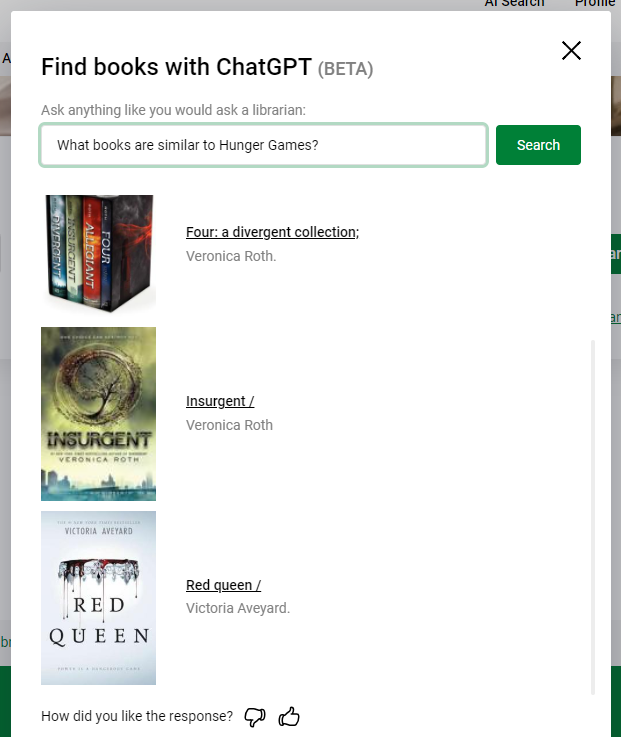5 ways to use ChatGPT in your library catalog
08/10/2023
In today's digital age, where information is just a click away, libraries are continuously evolving to provide patrons with seamless access to their vast collections. One such advancement can be the integration of ChatGPT, a cutting-edge language model developed by OpenAI, into library catalog searches. This innovative feature may to transform the way users interact with library collections, enabling them to explore bibliographic records using natural language queries and receive responses that not only match their requests but also provide direct links to relevant resources.

The Power of Conversational Queries
Traditionally, searching library catalogs involved using specific keywords or phrases, which could sometimes be limiting and frustrating for users who were unsure of the exact terms to use. With the integration of ChatGPT, library staff and users can now engage in natural language conversations, making queries as simple as asking a friend for recommendations. This user-friendly approach breaks down the barriers between patrons and the wealth of information held within library collections.
1. Exploring Similar Books and Bestsellers
One of the most exciting features of this integration is the ability to find books similar to a favorite title. Users can now ask ChatGPT for recommendations based on a book they enjoyed, and the system will provide a curated list of similar works available in the library. Now you can "ask" the library catalog questions like What other books are like Hunger Games? This not only introduces users to new and related materials but also enriches their reading experience by broadening their literary horizons.
Moreover, the integration allows users to inquire about New York Times or other bestsellers available in the library's collection. Instead of manually searching through lists or websites, patrons can simply ask ChatGPT for the latest bestsellers, complete with direct links to their bibliographic records. This streamlined approach saves time and effort while ensuring that users stay up-to-date with popular and trending titles.
2. Unearthing Gems on Any Topic
ChatGPT's remarkable ability to comprehend and generate human-like text extends to aiding users in discovering the best books on any topic of interest. Whether users are looking for in-depth research materials, compelling fiction, or practical guides, they can now interact with the library's catalog in a conversational manner. By asking questions like, "What are the best books on sustainable living?" or "Can you recommend books about ancient history?" users receive tailored responses along with links to relevant resources, fostering a more efficient and enjoyable research experience.
3. Enhancing Library Staff Support
This integration not only benefits library users but also empowers staff to provide more personalized and efficient assistance. When patrons pose complex questions, library staff can leverage ChatGPT to generate well-informed responses quickly. This collaborative effort ensures that users receive accurate and comprehensive information, ultimately strengthening the relationship between libraries and their communities.
4. Embracing the Future of Bibliographic Exploration
The integration of ChatGPT into library catalog searches marks a pivotal moment in the evolution of libraries. By bridging the gap between patrons and the vast array of resources they hold, libraries are becoming more accessible and user-centric than ever before. The ability to engage in natural language conversations, receive personalized recommendations, and access direct links to bibliographic records transforms the way users interact with library collections, making the process more engaging, efficient, and enjoyable.
As libraries continue to embrace technological innovations, the integration of AI-driven tools like ChatGPT sets a precedent for the future of information access and exploration. With this revolutionary feature at their fingertips, both library staff and users are poised to embark on a journey of discovery that transcends the confines of traditional catalog searches. The library is no longer just a repository of knowledge; it's a dynamic, interactive, and adaptive hub that empowers individuals to explore, learn, and grow in ways previously unimagined.
5. Simplifying Integration for Seamless Adoption
One of the most appealing aspects of the ChatGPT integration into library catalog searches is its simplicity and ease of implementation. Libraries can leverage existing library catalog APIs to seamlessly integrate this feature into their systems. With API access provided by the library, setting up the ChatGPT-powered search functionality is a straightforward process. Libraries can opt to embed the search window as a modal window on their websites, making it seamlessly accessible to users. This intuitive setup ensures that both library staff and users can quickly harness the power of ChatGPT without any technical hurdles. By minimizing the complexity of integration, libraries can swiftly embrace this cutting-edge tool and offer their patrons a transformative, conversational search experience that enhances their bibliographic exploration journey.
Reach out to find out more.